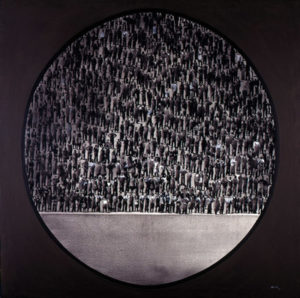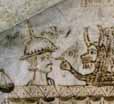Political Theology or Theological Politics? Hugo Ball, Early Christian Hagiography, and a New Vision for Society
by Sebastian P. Klinger
 A contribution to modernist studies and the history of political ideas, this article examines the unlikely intellectual dialogue between Carl Schmitt (1888–1985) and the former Dadaist Hugo Ball (1886–1927), a dialogue that frames the formative scene of politico-theological discourse in the twentieth century. Based on close readings of Ball’s aesthetic, intellectual, and philosophical exchanges with Schmitt, the essay offers insights into the peculiar case of a Catholic intervention into political theology.
A contribution to modernist studies and the history of political ideas, this article examines the unlikely intellectual dialogue between Carl Schmitt (1888–1985) and the former Dadaist Hugo Ball (1886–1927), a dialogue that frames the formative scene of politico-theological discourse in the twentieth century. Based on close readings of Ball’s aesthetic, intellectual, and philosophical exchanges with Schmitt, the essay offers insights into the peculiar case of a Catholic intervention into political theology.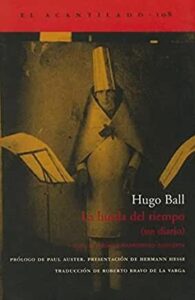
The essay begins:
For more than a century, political philosophers and cultural critics have grappled with the problem of political theology, whose resurgence seems to align with the crises of liberal democracy. Defined in general terms as the reassertion of religion’s place within the putatively secularized public sphere, political theology has sparked extensive scholarly debates in the past two decades, driven by the work of social, legal, and political theorists such as Giorgio Agamben, Claude Lefort, Chantal Mouffe, Paul Kahn, and Eric Santner. At the center of these debates is the conceptual legacy of the right-wing jurist and political philosopher Carl Schmitt (1888–1985). In his influential book Political Theology (1922), Schmitt postulates that “all significant concepts of the modern theory of the state are secularized theological concepts” and links this claim to a theory of sovereignty that invests power with transcendent authority. To finesse and further the understanding of the founding scene of political theology, the present essay rereads Schmitt’s dialogue with the artist Hugo Ball (1886–1927), which paralleled the publication of Political Theology in 1922. Bonding over Catholic values, Ball and Schmitt studied each other’s writings, exchanged letters, met in person, and discussed their book projects. But the elective affinity between the Dadaist-turned-oblate and the prospective “Crown Jurist” of the Third Reich ground to a halt after Ball published the first-ever examination of Schmitt’s thought. The study at hand analyzes how Schmitt and Ball begin from Catholic principles but then move apart as they seek to define political theology.
Ball’s contribution to political theology has been mostly overlooked in the wider scholarly debate for three reasons: the historic encounter of Ball and Schmitt seems unlikely; the texts in which Ball’s critique unfolds are hermetic and difficult to access; and the thrust of his argument points in a direction different from more recent studies on economic-political theology. Today, Ball remains best known for his flamboyant involvement with the Zurich art movement Dada, in particular, for his legendary performance as a “magical bishop”; for his friendships with Walter Benjamin and Ernst Bloch; and for an antiwar activism that expanded into a thorough intellectual critique of German militarism. But in the aftermath of the Great War, the former Dadaist broke with his left-wing past and returned to the Catholicism of his childhood, searching for a form of life that negated the violent turn of Western culture. It was then that he entered into dialogue with Schmitt, whom Ball initially perceived as a new Catholic philosopher, “great and expansive like a scholastic.” Between 1919 and 1925, they discussed what political theology could mean—an urgent question in the face of the historically unprecedented opportunity to rethink Germany’s social order from scratch after the November Revolution of 1918–19 had unseated the emperor and launched the country on its ill-fated and crisis-ridden experiment with parliamentary democracy.
Ball and Schmitt shared many concerns, but their dialogue revealed fundamental divergences on political theology. Near the end of their exchange, Ball noted: “In my experience, reaching an understanding with someone else is a thorny and delicate matter. For this reason one has to write books.” In direct response to the appearance of Schmitt’s seminal Political Theology, Ball published two texts of his own that are entwined with his turbulent exchange with Schmitt. One of these texts bears in an obvious way on the dialogue: Ball’s essay “Carl Schmitt’s Political Theology” (1924) combines a magisterial command of Schmitt’s thought with a subtle but scathing intellectual critique of his interlocutor. It points out the shortcomings of political theology with regard to the nature of the zoon politikon, the concept of politics, and the notion of sovereignty. Concurrently, Ball laid out his own political vision in a strange book entitled Byzantine Christianity: The Lives of Three Saints (1923). This book focuses on the form of life developed by John Climacus, a monk and hermit of the seventh century; Dionysius the Areopagite, a late fifth- to early sixth-century Christian theologian and philosopher; and Saint Simeon Stylites, a fourth-century anchorite. Although Ball’s startling turn to hagiography seems to stand out as a departure from pressing questions of politics, Byzantine Christianity contains, paradoxically, a new vision for German society. Why, though, did Ball choose the genre of hagiography to convey his ideas? In what follows I will argue that these two texts work together as an intervention into political theology.
Approaches to the later work of Ball tend to fall into two camps: that of his “Catholic quietude” and that of a “sacralization of power.” Yet Ball’s association and interaction with Schmitt complicates both of these arguments. My argument differs from the quietude thesis, as it shows that Ball strives to deactivate the distinction between friend and enemy as the “specific political distinction to which political actions and motives can be reduced.” And it differs from the “sacralization-of-power thesis,” as Ball’s theological politics seeks to establish the transcendent law as an “institution” that “can never come into direct relation with the state.” For Ball, the church becomes an institution only in its suspension; what legitimizes it is resistance to a government gone rogue. Basing my argument on close readings of Ball’s Byzantine Christianity and “Carl Schmitt’s Political Theology,” I contend that such theological politics must be conceived as a critique of Schmitt’s thought. If Schmitt legitimizes political authority with a transcendent source, Ball delegitimizes it; if Schmitt glorifies the sovereign, Ball champions the saint; if Schmitt does away with human rights, Ball declares “opposition” to the violation of human rights as “the highest duty.” I develop my argument in two steps: I begin with a discussion of Ball’s political vision in Byzantine Christianity, paying close attention to the aesthetic form of the book and its place in history. I then examine Ball’s “Carl Schmitt’s Political Theology” and bring out his critique of Schmitt. Continue reading …
SEBASTIAN P. KLINGER is a PhD candidate in the Department of German at Princeton University. His research investigates sleep experiments in literature, science, and society, 1899–1929.

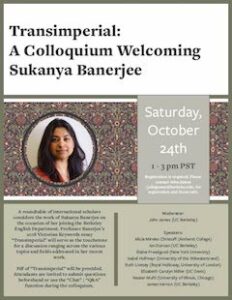 A roundtable of international scholars considers the work of
A roundtable of international scholars considers the work of 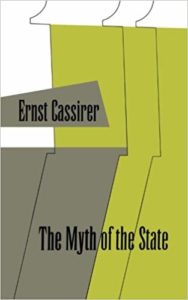 The coincidence of the Trump presidency in the United States and the upsurge of rightwing movements in Europe, including Alternativ für Deutschland, make this an appropriate moment for reconsidering Ernst Cassirer’s analysis of fascism in the last chapter of The Myth of the State. Composed in the 1940s, when Cassirer was in the United States, and published posthumously in 1946, The Myth of the State was Cassirer’s last and most explicitly political work. In this work he suggested that the right lens for thinking about authoritarian political movements was myth, not the organic myth of earlier primitive cultures but instead the manufactured myth of late capitalism, which involved the appeal to irrational instincts and the manipulation of symbols. At the same time, Cassirer held on to the possibility of a rational critique of fascism. In our current era of such manufactured myths as “fake news” and “the caravan,” it is worth reflecting on an earlier historical moment when Cassirer confronted the manufactured myths of the Nazi state and offered a defense of rationality missing from much of our current political conversation. In this essay, I explore the basis of Cassirer’s surprising optimism, which I argue has to do not simply with his “symbolic turn,” his critique of neo-Kantianism for its neglect of language and other symbolic systems in shaping human experience, but with his recovery of art as central to the human capacity for critical thinking and his linking of this capacity to the survival of Jewish ethical traditions.
The coincidence of the Trump presidency in the United States and the upsurge of rightwing movements in Europe, including Alternativ für Deutschland, make this an appropriate moment for reconsidering Ernst Cassirer’s analysis of fascism in the last chapter of The Myth of the State. Composed in the 1940s, when Cassirer was in the United States, and published posthumously in 1946, The Myth of the State was Cassirer’s last and most explicitly political work. In this work he suggested that the right lens for thinking about authoritarian political movements was myth, not the organic myth of earlier primitive cultures but instead the manufactured myth of late capitalism, which involved the appeal to irrational instincts and the manipulation of symbols. At the same time, Cassirer held on to the possibility of a rational critique of fascism. In our current era of such manufactured myths as “fake news” and “the caravan,” it is worth reflecting on an earlier historical moment when Cassirer confronted the manufactured myths of the Nazi state and offered a defense of rationality missing from much of our current political conversation. In this essay, I explore the basis of Cassirer’s surprising optimism, which I argue has to do not simply with his “symbolic turn,” his critique of neo-Kantianism for its neglect of language and other symbolic systems in shaping human experience, but with his recovery of art as central to the human capacity for critical thinking and his linking of this capacity to the survival of Jewish ethical traditions. VICTORIA KAHN
VICTORIA KAHN